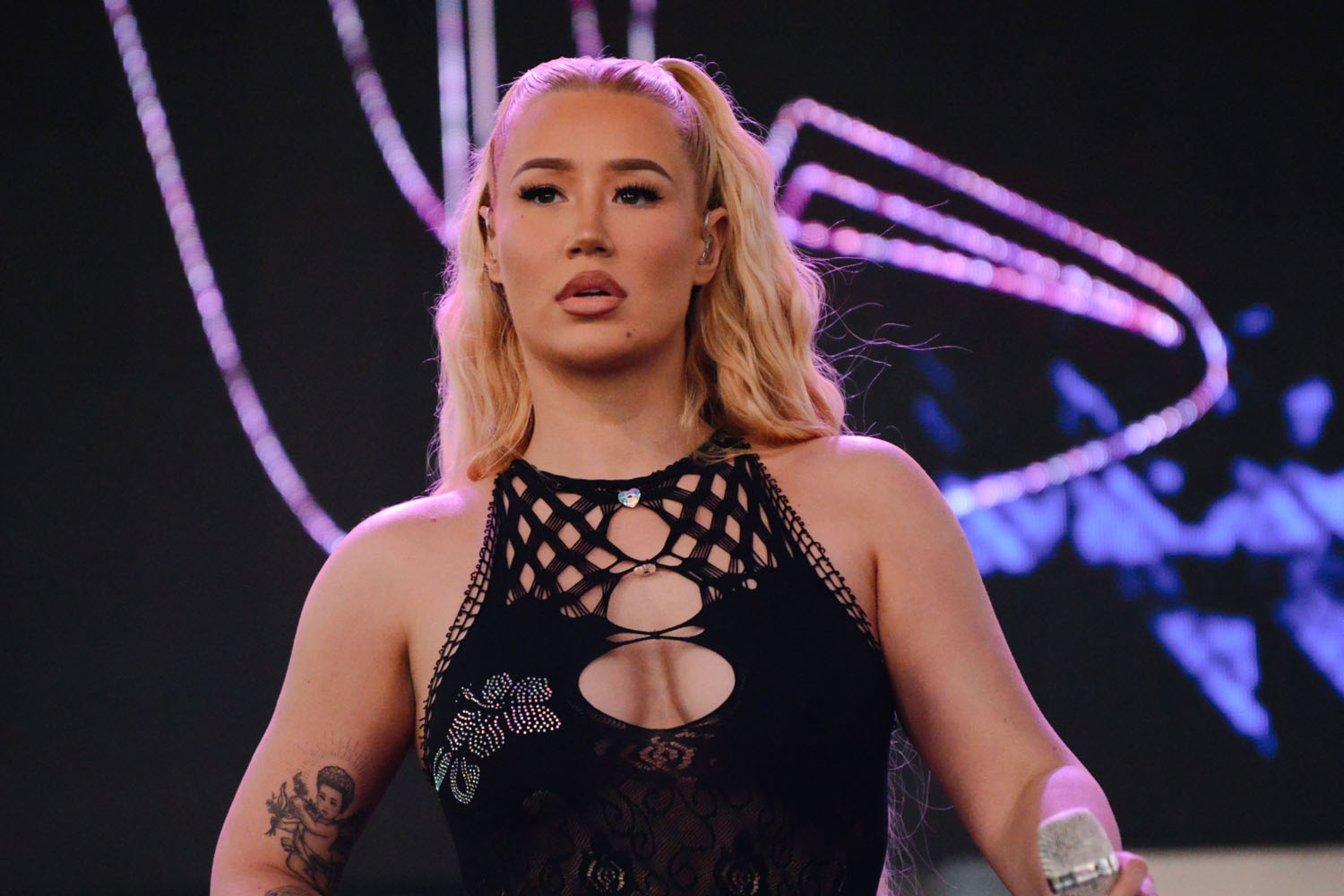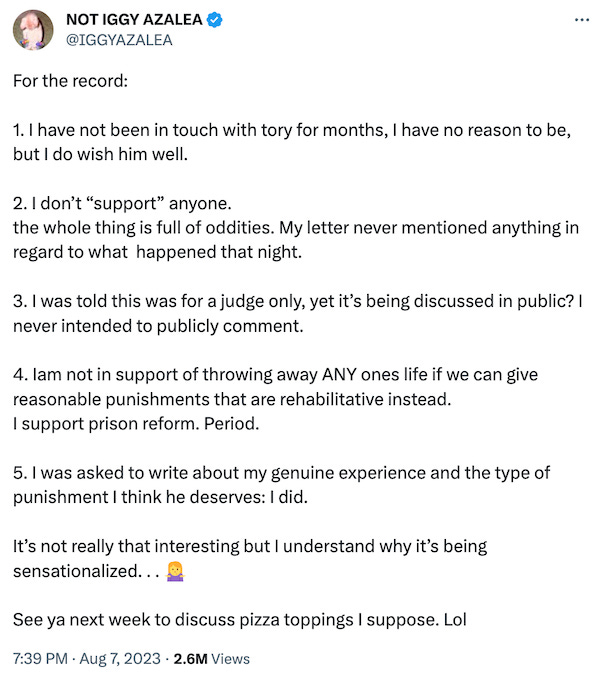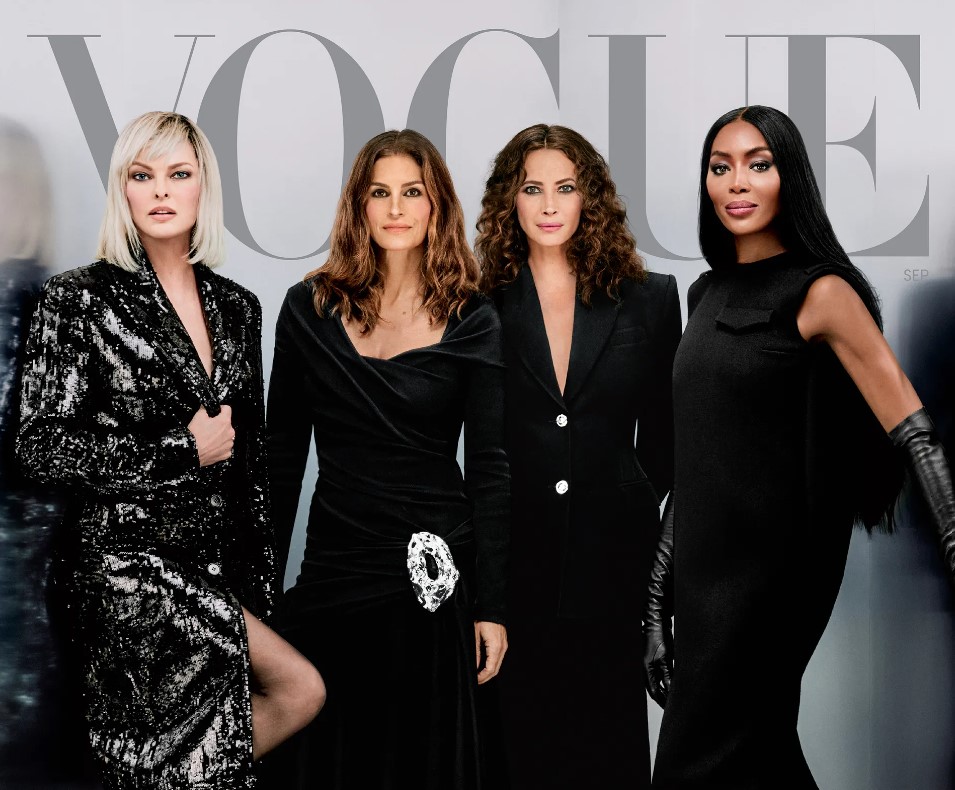Save it, Iggy



A Los Angeles reporter is exposing actors, musicians and hair transplant doctors for writing letters of support for disgraced musician Tory Lanez who was recently sentenced to 10 years in prison after being found guilty of shooting Megan Thee Stallion in the summer of 2020.
The reporter’s name is Meghann Cuniff. And for the duration of this trial, she’s provided extensive coverage and at times, analysis. Meg supporters have been vocal about their appreciation for Meghann’s work, but when she recently exposed letters from a bunch of C-list stars (and I’m being generous here) like Mario Barrett, Stefflon Don and Marc John Jeffries, the activity on social media really ramped up. But it was the letter, written back in February by none other than the ever-confused and awful-sounding Iggy Azalea, that set Black Twitter ablaze.
An article that included the letter in its entirety begins with the following disclaimer and really sets the stage for the absolute sh-t show that follows:
“The quotes in this article are taken verbatim from the letter, including misspellings, punctuation errors and typos.”
Iggy begins by telling Judge Herriford that she’s been a “successful musician for the last decade”, listing a bunch of accolades, including the sale of over 65 million records, having number 1 hits on the Billboard Hot 100 and breaking a record previously held by The Beatles. Then she adds this line which sent the internet into an absolute frenzy.
“In short, like yourself, I’m great at what I do and well-respected by my peers.”
Needless to say, people had an absolute field day reacting to Iggy putting her delusion on full display – something she says she didn’t intend to. In a now-deleted tweet, which Meghann, of course, has the receipts for, she says she “didn’t intend to publicly comment” and was told the letter was “for a judge only”. She ends her tweet saying it's “not that interesting” but she understands why it’s being sensationalized. But does she? Does she really understand?

For the duration of her career, Iggy has profited off of imitating Black culture. From her songs to her Blaccent to her aesthetic, she’s made it very clear that she is anything but original, and a huge portion of her success has come from doing what Black women do better than she ever will. Unfortunately, because of her whiteness, she gets the credit they don’t.
In 2016, The Washington Post published an article exploring her rise to fame, calling it “the strangest turn on the music scene in recent years,” and referred to her as “the Donald Trump of the rap game: racially divisive, prone to ugly rants — and confoundingly popular.”
The article goes on to point out that when her awful earworm of a song "Fancy" came out several years ago, she became the fourth solo female rapper to top the Billboard Hot 100, as she so clearly outlined in her letter to Judge Herriford. The article also points out that she held the first and second spot on the Billboard chart, which is a feat not even Beyoncé can lay claim to.
That’s the problem. When white women like Iggy Azalea come onto the music scene and base their career and brand off of imitation and cultural appropriation and acquire more success in some aspects than someone like Beyoncé, it really puts on full display the unevenness of the playing field.
Several musicians and cultural critics have commented on her capitalization off of Black culture. Singer Jill Scott appeared on Sway In The Morning, saying:
“It sounds like a big bite to me — the tone of voice,” citing the work of rappers like Eve and Da Brat, whose sound Iggy emulates, in a sort of no-name brand, cheap alternative kind of way.
Even before that interview with Jill Scott, Brittney Cooper, a culture critic and assistant professor at Rutgers, took her criticism of the artist a step further than Jill would a year later, asking why in an essay she wrote.
“The question is why? Why is her mimicry of sonic Blackness okay?... I resent Iggy Azalea for her co-optation and appropriation of sonic Southern Blackness, particularly the sonic Blackness of Southern Black women.”
And that is just one of several reasons why her penning this article in support of Tory Lanez was the wrong move. Meg represents the exact artist and identity that Iggy herself has hijacked and tried to pull off as her own. Meg is a southern girl hailing from Houston, Texas. Meg is Black. Meg is an amazing rapper and entertainer. Meg is everything Iggy isn’t.
In her letter, Iggy wrote of Lanez:
“I’ve never encountered this jealous, rage filled person he’s accused of being. I know him to be someone who’s always bursting with happiness. In the moments you want to cry, if you call daystar, he will find a way to make you laugh.”
She went on to say:
“I deeply appreciate the person he is and have never witnessed him loose [sp] his temper or raise his voice at a woman. He’s always been incredibly respectful of me and I refuse to believe that he would do anything in malice especially to a woman.”
Iggy is doing something that a lot of white women do – and often. She is centering her experience and encounters with him and assuming that it’s universal. And despite being a victim of domestic violence herself, she is putting forth a false and harmful narrative that if it didn’t happen to her, it couldn’t possibly happen to anyone, when we know that’s categorically incorrect, especially when you look at domestic violence statistics.
According to the Blackburn Center, an organization aimed at ending violence, more than 40% of Black women will experience domestic violence in their lifetime, compared to 31.5% of white women. A report from the National Center for Victims of Crime found that nearly 54% of Black women experienced psychological abuse, and 41.2% of Black women experienced physical abuse. And perhaps the most disturbing finding to come out of these reports is that Black women are 2.5 times more likely to be murdered by men than white women.
Iggy touched on her own experience with domestic violence in her letter, writing:
“I must make note of the things ive suffered through so that you understand definitively: I would not write to you on behalf of an abuser.”
But even with the cold hard facts of the case laid out in front of her, the verdict issued from a court of law, and the traces of harassment, gaslighting and online abuse Meg faced at the hands of not only Tory, but other celebrities and his supporters, which include this woman, who blames Meg for the fact that she missed work to come to the courthouse and complained about parking meter fees, Iggy still penned this letter.
In her tweet, Iggy suggests people are “sensationalizing” her letter of support. Her categorization of the backlash to the letter as sensationalizing is weak, as are her lyrics, delivery and intellect. Because what we’re actually doing is highlighting the luxury and privilege white women like Iggy have to emulate and profit off of Black culture while distancing themselves from the very danger of being an actual Black person. And what we’re actually doing is highlighting the danger and irony of her offering up support in any form for a man who could have killed one of the women she wants to be.
